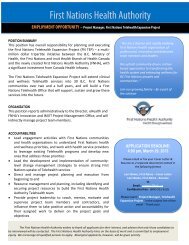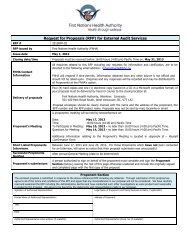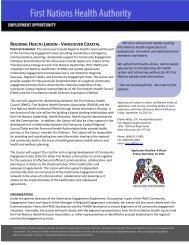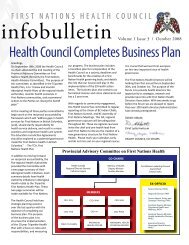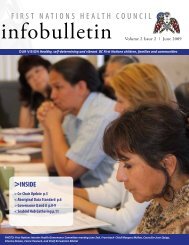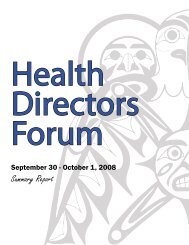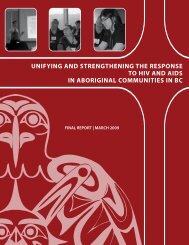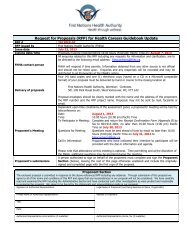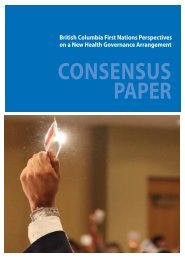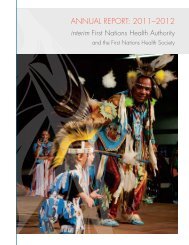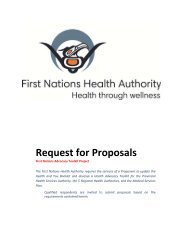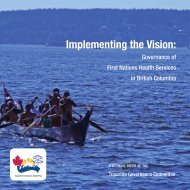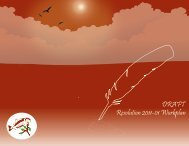pdf download - First Nations Health Council
pdf download - First Nations Health Council
pdf download - First Nations Health Council
You also want an ePaper? Increase the reach of your titles
YUMPU automatically turns print PDFs into web optimized ePapers that Google loves.
• Develop our own research policies, programs<br />
and a <strong>First</strong> <strong>Nations</strong> Research Centre of<br />
Excellence<br />
• Research must adhere to the principles of OCAP<br />
• Develop <strong>First</strong> <strong>Nations</strong> policies and program<br />
development related to <strong>First</strong> <strong>Nations</strong> research<br />
• Develop BC <strong>First</strong> <strong>Nations</strong> Research Centre of<br />
Excellence<br />
Community <strong>Health</strong> Plans<br />
As a result of current health programming<br />
many <strong>First</strong> <strong>Nations</strong> have developed various forms<br />
of Community <strong>Health</strong> Plans. The TFNHP identifies<br />
the need for these community plans to support<br />
better coordination with the Aboriginal <strong>Health</strong><br />
Services Plans that the Regional Provincial <strong>Health</strong><br />
Service Authorities are to develop consistent with<br />
the TFNHP priorities and <strong>First</strong> <strong>Nations</strong> involvement<br />
in decision making about health service delivery.<br />
The discussion at the 2008 Gathering Wisdom<br />
forum sought to contribute to clarifying what the<br />
components a ‘community health plan’ are and<br />
whether there is a connection between them and<br />
performance tracking.<br />
• Direction for planning and wants, social<br />
determinants, holistic, cultural foundation that<br />
meets needs<br />
• Does the direction for planning and wants for<br />
communities look at all social determinants of<br />
health?<br />
• It is a holistic approach which has a cultural<br />
foundation that meets the community needs<br />
component<br />
• Definition of “health”, “community” and<br />
“Community <strong>Health</strong> Plans”<br />
• Principles, vision, mission statement<br />
• Evaluation framework<br />
• Statistics from programs/services<br />
• Causal factors<br />
• Traditional and contemporary practices<br />
• Staff retention/mentoring/leadership/<br />
recruitment<br />
• Accountability framework<br />
• Reciprocal accountability<br />
• Knowing when you have been successful<br />
• Evaluation of programs and services<br />
Open Space Responses<br />
• FNIHB provide a summary report of the Pilot<br />
Projects Flexible Transfer Process: report will<br />
include: activities, funding, challenges, positive<br />
impact, and identified new opportunities for<br />
these communities. This report made available<br />
to all <strong>First</strong> <strong>Nations</strong> communities.<br />
• Consultation process needs to change,<br />
community members need to be informed at<br />
the community level.<br />
• Recommendation: <strong>First</strong> <strong>Nations</strong> <strong>Health</strong> <strong>Council</strong><br />
should apply knowledge management principles<br />
and process to collect, analyze and assimilate<br />
knowledge on aboriginal health topics in an<br />
effective and efficient manner; otherwise, how<br />
can <strong>First</strong> <strong>Nations</strong> benefit? We have limited<br />
time and resources. A lot of great work has<br />
been done on indigenous health. Learn what<br />
knowledge management is and how to do it.<br />
Topics as directed by <strong>First</strong> <strong>Nations</strong>. Caring for<br />
first <strong>Nations</strong> Children Society of Canada does<br />
knowledge management well – be as good.<br />
25<br />
VANCOUVER, bC • mAY 20 - 21 , 2008



